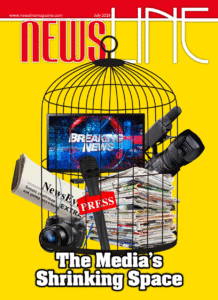Editor’s Note: July 2019
By Rehana Hakim | Editor's Note | Published 6 years ago
 In an interview with Newsline this month, the Prime Minister’s special assistant on Information and Broadcasting, Firdous Ashiq Awan, stated that “the media is absolutely free” and that “censorship exists only in our minds.”
In an interview with Newsline this month, the Prime Minister’s special assistant on Information and Broadcasting, Firdous Ashiq Awan, stated that “the media is absolutely free” and that “censorship exists only in our minds.”
How then, does the PTI government explain the pulling off air an interview of the former President of Pakistan, Asif Zardari, by Hamid Mir of Geo News, shortly after it began?
PEMRA distanced itself from the act and PTI was silent, as always. So exactly who was responsible for censoring Zardari? Is there an official list of politicians who are banned from appearing on television?
Mir asked a very pointed question: Was Zardari a “bigger criminal” than TTP’s former spokesperson, Ehsanullah Ehsan (his party was responsible for the murder of several thousand Pakistanis), who gave an interview from “official custody,” unlike Zardari, who was interviewed in parliament?
A perfectly legitimate question. Reporters are beginning to feel the heat and complaining – some mutedly and some vociferously – of the barriers that are coming up.
There are far too many no-go areas that are off-limits for them; a long list of holy cows and persona non grata that they are warned to steer clear of; this, in addition to a plethora of press advices and laws and threats to contend with. The fate of those colleagues who have crossed the ‘red line’ is before them. A few have gone missing; some are still doing the rounds of courts – and then there are those who have been booted out.
Editors and anchorpersons, too, are finding it increasingly difficult to manoeuvre the tricky terrain. One wrong move and their publication or channel could be in jeopardy. Laws are being applied with impunity and more are on the anvil.
Does the press deserve all this?
Its role is that of a watchdog and, contrary to expectations, it cannot be expected to sing paeans to the government of the day. But having said that, like in all professions, journalism too has its ‘enfant terribles’ who have used the profession to advance their own agendas, who have blackmailed politicians and political parties, who have sought bribes and resorted to disinformation campaigns when turned down. But a few rotten eggs cannot be used to discredit and penalise the entire media.
There have been complaints of the distribution of newspapers and the airing of TV channels being stopped in certain areas. And of the muting of channels. Additionally, advertising is being used as a stick to beat the media into falling in line. Government advertising is contingent upon “good behaviour.” Working journalists have suffered as a consequence. ‘Errant’ media houses have had to downsize, forcing journalists to leave or take salary cuts. By choking a group’s financial lifeline, the government is hoping to stifle dissent and criticism.
Prime Minister Imran claims to have a working democracy in place. How does stifling dissent serve the cause of democracy?
If anything, it only serves to amplify the weaknesses of a government that is still struggling to find its feet.
Rehana Hakim is one of the core team of journalists that helped start Newsline. She has been the editor-in-chief since 1996.


